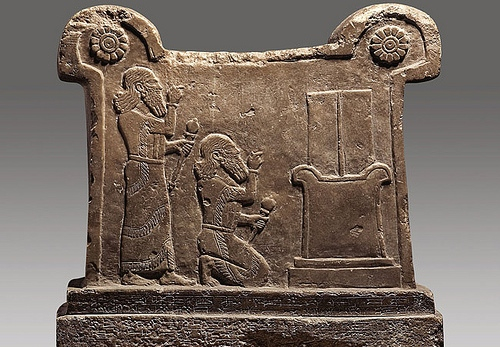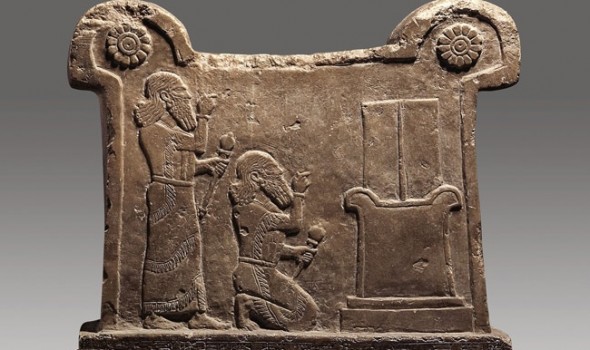How did human beings who lived five thousand years ago view themselves? How did they make decisions and how did they reflect on their past? Julian Jaynes (1920 – 1997) proposes a radical answer to these questions: until a few thousand years ago human beings did not ‘view themselves’. They did not have the ability: they had no introspection and no concept of ‘self’ that they could reflect upon. In other words: they had no subjective consciousness.
Jaynes calls the mental space of these pre-conscious people the bicameral mind. It is a mind with two chambers, the mind that is divided in a god part and a human part. The human part heard voices and experienced these as coming from gods. These gods were no judging, moral or transcendent gods, but were more like each person’s problem solvers. They were hallucinated voices that provided the answers when a person entered a stressful situation which couldn’t be solved by routine.
This is not to say that people with a bicameral mind were barbarians waving their bludgeons and uttering monosyllabic sounds. They were social creatures with a fully developed language. But language alone is not enough for consciousness, according to Jaynes. The pivotal question is which concepts are available in a language. Consciousness, in Jaynes’s definition, is a box of conceptual tools that is not ‘included with the hardware’. It is ‘software’ that had to be invented, like tools such as the wheel. The most important transitional phase towards this new mentality occurred between 1000 and 500 B.C., an era from which textual sources are available: the most telling ones are the Iliad, the Odyssey and of course the Bible.
Jaynes’s definition of consciousness
It is important to notice how Jaynes defines consciousness. It has nothing to do with perception or sensation. This means that many common connotations of the word are excluded. For example, the ‘conscious experience’ of a bright color red, or a sharp pain. These examples of subjective experience, that fascinating aspect of our mental life, is not what Jaynes wants to explain. However fascinated he may be by the question ‘where the color red is’ when we watch the setting sun – nothing but gray matter in our heads, after all – he is searching for another holy grail: how is it possible that we can pose these kinds of questions at all? Our puzzlement about our experience of the setting sun presupposes an advanced way of looking at ourselves, an advanced, reflective theory of mind. How did that ability evolve?
So then what is consciousness in Jaynes’s definition? As a first approximation: it is a process, not an immediate sensation. It is a narrative way of thinking which makes us capable of making judgments and decisions. It is a sort of self management. With consciousness, we do not need voices of gods or other superior beings. We have the capability of picturing ourselves as individuals with memories, a past, a future and a (more or less) free will. A conscious individual can view himself ‘from above’ and give orders to himself. He has tools, as it were, to isolate scenes from his life and to project these on an imaginary screen. To edit those at his own wish, and combine them into different scenarios.
Where does this ability originate from? Jaynes:
Subjective conscious mind is an analog of what is called the real world. It is built up with a vocabulary or lexical field whose terms are all metaphors or analogs of behavior in the physical world.
What does this mean: ‘metaphors or analogs of behavior in the real world’? It means that the language in which we reason is built from metaphor. Take the concept of memory. We imagine memory somewhat like a container which can hold mental stuff, which can become full, in which one sometimes pokes in vain. Such a container does not really exist, but it is a useful way to visualize an aspect of our mental behavior.
In a sense, our entire mental vocabulary is figurative or metaphorical. Even the way in which we imagine time is metaphorical: a spatial extendedness. We place events on a timeline, on which left and right are analogue to before and after. Thus, a coherent story about the ‘self’ can be told, that wonderful fiction. No easy accomplishment! It must have been a long road for humandkind to invent it.
The bicameral mind of the Iliad
What did the world look like before consciousness came into being? Jaynes searches for answers in the Greek epic the Iliad (eighth century BC). According to Jaynes, this work of literature was created in a time in which the bicameral mind was already breaking down, but was still operational to an important degree.
The remarkable thing about the heroes of the Iliad is that they don’t show initiative and do not reason about their behavior. Everything is given to them by their gods. These tell or instruct their fellow humans something, and man acts accordingly. The gods are in charge and man can only be his puppet. Jaynes:
The characters of the Iliad do not sit down and think out what to do. They have no conscious minds such as we say we have, and certainly no introspections. It is impossible for us with our subjectivity to appreciate what it was like. When Agamemnon, king of men, robs Achilles of his mistress, it is a god that grasps Achilles by his yellow hair and warns him not to strike Agamemnon (1:197ff.). It is a god who then rises out of the gray sea and consoles him in his tears of wrath on the beach by his black ships, […] a god who leads the armies into battle, who speaks to each soldier at the turning points, who debates and teaches Hector what he must do, […]
The ever present involvement of gods is regarded by many historians as only a poetic device, a playful way of the writer(s) of the Iliad to enliven the deeds of the protagonists. Jaynes, however, argues that the gods should not be taken as a literary trick. Instead, their presence in literature is a faithful reflection of their omnipresence in everyday experience.
The gods are, as mentioned before, no judging, moral gods, but were perceived more like authorative personal problem solvers of each man. In disturbing or very novel situations man hears – hallucinates even – what he has to do. According to Jaynes, in a similar fashion as schizophrenes in our time, who still hear voices that tell them what to do.
So this is the bicameral or two-chambered mind. A mind that is not yet undivided (individual) and does not make conscious decisions. In a sense, this mind does not make decisions at all, since all action is either a matter of routine or directly based on what is spoken to man by his god-side.
The origin of the bicameral mind
Jaynes speculates about the origin of the divided nature of the bicameral mind. Imagine, he proposes, a stage in the evolution of mankind where there was a primitive language, but nothing remotely like consciousness, like self-management. We imagine a social context of a small group of hominid hunter/gatherers. Language was to these creatures a great tool for exchanging information and enforcing power. Initially, language was exclusively audible, always something external. Only when complex solitary behavior was required, was there an evolutionary advantage for some form of internal speech. It is plausible that the first inner speech acts were copies of the most elementary external communicative act: a spoken command from one person to another.
This internalization of a communicative act – which by definition always involves two parties – is a possible explanation for the origin of the divided nature of the bicameral mind. The inner voice speaks, man acts upon it. In an early stage these voices might have been echoic repetitions of an order made by a leader. In more advanced stages they could have incorporated more and more knowlegde and intelligence and might have been ascribed to higher beings which transcended the direct social circle: the god-king for example.
This mental structure constituted the cohesive force of the social hierarchy in early civilizations. The voice was the authorative force which controlled human action. Remember we are talking about a time without a written law. This explains why real-life authorative figures like kings were identified as gods. They were in a very real sense gods. Namely in the sense that they were, ultimately, the voice that had to be obeyed. The origin of the belief in after-life becomes understandable from this perspective. After the king died, his imagined voice did not vanish immediately (Jaynes re-interprets the puzzling Old-Egyptian word ka, which scholars have translated as soul or ‘cosmic double’, as meaning bicameral voice).
The breakdown of the bicameral mind
The bicameral mind grew organically from a straightforward social structure. And the knife cuts both ways: the bicameral mind depended on such a structure in which it could thrive (schizophrenia can be viewed as a relapse that is utterly disfunctional in modern society). As societies grew larger and increasingly more complex, all kinds of intermediates/priests, ‘intermediate gods’ and idols were necessary to manage affairs (idols, according to Jaynes, are a way to invoke the speech of the god).
It is conceivable that a society that is organized in such a bicameral-bureaucratic way becomes vulnerable at a certain level of complexity. Indeed, there are many historical examples of dynasties that collapsed, apparently without external cause such as disasters. Another factor that would undermine the bicameral mind was the invention of writing. As a result, the voices could no longer remain the highest authority. They would be replaced by the Law, carved in stone or written on paper.
The rigid bicameral mind might not be flexible enough to deal with complex social dynamics. Whatever the direct cause was – a big earthquake of flood? – from all sources it appears that in the second millennium B.C. it was a chaos of mass migration and war in the area we now call the Middle-East. From that era stems the first evidence that the bicameral mind was eroding.
The pictures display something that had never been seen before: a king who kneels before an empty throne. The texts from this era speak of gods having left humankind:
My god has forsaken me and disappeared,
My goddess has failed me and keeps at a distance,
The good angel who walked beside me has disappeared

A king who kneels before an empty throne… Cuneiform from the reign of King Marduk of Babylon, around 1230 B.C.
A lament that in a certain sense can still be heard today. The difference, however, is that the longing for God in our age is a romantic longing. The people who lived three millennia ago felt abandoned in the most literal, practical sense. They had nothing to guide them.
The origin of consciousness
By leaps and bounds, with intermediate phases we will probably never know of, and undoubtedly with relapses into old mentality, a new mind came into existence. A few crucial ingredients were needed. An important and very basic ingredient is the trick of spatializing concepts. Certain concepts are only imaginable if they are cast in spatial metaphor. The concept of time is a crucial example. The brilliant idea to imagine time as a spatial thing, for example a line, opens a world of possibilities. It makes history possible, both for a person and for a people. We daily rewrite our ‘autobiographies’. Keeping track of that is an essential element of consciousness. It makes a stable concept of ‘self’ possible.
Another crucial component of consciousness is the insight that human behavior is not caused by a god, but by the person himself. The initial cause of action had to be internalized. Some chapters of the Origin are about the complex evolution of this invention. A brief account of this extremely interesting phase follows here.
When the bicameral mind began breaking down, man had to start making decisions. In the bicameral age, the decision making process had been a non-conscious one: some inaccessible mental process (after all, most intelligent behavior stems from processes that are inaccessible to us) which resulted in an inner voice instructing what to do next. Man’s first attempts at making his own decisions are called divination. Examples are the studying of omens, watching the stars, throwing and studying sticks and bones (sortilege), ‘reading’ animals’ intestines, etcetera. These are all methods that project the will of the gods, who were still thought to exist, into the external world. So decision making was in this phase a process that took place in the world, not in the mind. Jaynes:
What is important here is to understand provoked divination such as sortilege as involving the same kind of generative processes that develop consciousness, but in an exopsychic, nonsubjective manner.
Iliad and Odyssey as transitional period
The next big steps took place when these ‘exopsychic’ methods were internalized. And so the gods were not needed anymore, at least not as instigators of human action. Man learned to picture himself as cause of his own action. And what would be better candidates for the instigators of action than sensations of the intestines? In the Iliad these are kradie, which is the heart, and phrenes, the lungs, and thumos, roughly the feeling of an adrenaline rush, or being in a state of fight-or-flight. It is thumos which can give strength, thumos which can be spoken to a and which can even speak itself to a man. Phrenes can be filled with anger. Noos is perception, derived from noein, to see. In the Iliad this objective meaning gets for the first time, however hesitatingly, the metaphorical, subjective meaning that is so important for consciousness (to ‘see something’ with your mind’s eye). ‘Speak, conceal not in noos, so that we both may know’.
The next important step is that these concepts get even more metaphorical attributes. The lungs can not only fill with anger, something can also be ‘put inside them’, a representation for example. Jaynes:
All these metaphors are extremely important. Saying that the internal sensations of large circulatory and muscular changes are a thing into which strength can be put is to generate an imagined ‘space’, here located always in the chest, which is the forerunner of the mind-space of contemporary consciousness. And to compare the function of that sensation to that of another person or even to the less-frequent gods is to begin those metaphor processes that will later become the analog ‘I’.
In the Odyssey these words get richer and more consciousness-like meanings. The thumos can give a command, the phrenes can even contain the description of a future event, or a secret. The kradie (heart) gives Odysseus a warning for imminent danger. These are all functions which were in previous eras accomplished by the gods. The process will finally result in an ‘I’ which unites them all.
Once the invention of this mindspace is completed, it leads to an explosion of Old-Greek philosophy. An entire new domain of knowledge emerges. From what stuff is this newly discovered Mind made? Is it immortal? The first great figure of this new order is Solon of Athens, with his revolutionary slogan: ‘know thyself’ – an advice that would have been unthinkable in the bicameral age.
The Bible
Jaynes also uses the Old Testament as a source of evidence. He reads it as a history of mentality. He invites us to compare the books of Amos and Ecclesiastes. Amos is an example of the bicameral mind (‘And God said unto me..’). Ecclesiastes, written six centuries later, is an example of subjective consciousness (‘I said to myself:…’).
The era of the prophets is a transitional phase. Only they can still experience the visions or auditory hallucinations of the gods. But also these figures lose their power. Around 400 B.C. the prophets have left the stage.
After the transition to a new mentality, the time is ripe for a religious reformation. The teachings of the New Testament can be seen as a religion for ‘people with consciousness’. Sin and contrition are now internalized.
Vestiges of the bicameral mind
An entire part is dedicated to the vestiges of this old mentality in our own minds. This interesting part, which I will not summarize here, contains all kinds of indirect evidence for the development of our present psychological state. I already mentioned schizophrenia, but also historical phenomenons like oracles and prophecy are taken into account. Until the present age we are reminded that there are phenomena like mediums, possession, hypnosis… these are all mental states that resemble the ancient bicameral mind in the sense that they depend on a lower level of consciousness and an externalization of control.




